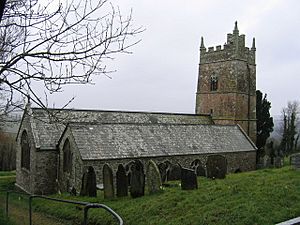St Anne's Church, Whitstone facts for kids
Quick facts for kids St Anne’s Church, Whitstone |
|
|---|---|

St Anne’s Church, Whitstone
|
|
| 50°45′39.34″N 4°27′51.27″W / 50.7609278°N 4.4642417°W | |
| Location | Whitstone |
| Country | England |
| Denomination | Church of England |
| History | |
| Dedication | St Anne |
| Administration | |
| Parish | Whitstone |
| Deanery | Stratton |
| Archdeaconry | Bodmin |
| Diocese | Diocese of Truro |
| Province | Province of Canterbury |
St Anne's Church in Whitstone, Cornwall, England, is a very old and important church. It is a Grade I listed building. This means it is a special historic place. The church is part of the Church of England and serves the local community.
History of St Anne's Church
This church was first built a very long time ago, in the 1200s. Imagine how many years that is! Parts of the church, like the top of the tower and the archways (called arcades), were added later in the 1400s.
In 1882, the church had a big makeover. The chancel (the area around the altar), the porch, and the inside of the church were rebuilt. This work was done by Samuel Hooper. New windows were also put in by Messrs Beer and Driffield. All these improvements cost about £2,000 at that time.
Churches in the Parish
St Anne's Church is part of a "joint parish." This means it works together with several other churches in the area. They share resources and help each other.
The churches in this joint parish are:
- St Gregory's Church, Treneglos
- St Werburgh's Church, Warbstow
- St Winwaloe's Church, Poundstock
- Our Lady and St Anne's Church, Widemouth Bay
- St Gennys’ Church, St Gennys
- St James' Church, Jacobstow
- St Mary the Virgin's Church, Week St Mary
The Church Organ
An organ is a large musical instrument often found in churches. It makes music using air flowing through pipes. A new organ was given to St Anne's Church in 1880. It was a gift from Edward Mucklow, who lived nearby.
The Church Bells
Churches often have bells that ring out for services or special events. St Anne's Church originally had three medieval bells. In the 1700s, a fourth bell was added.
Later, in 1831, one of the bells, called the tenor bell, was remade by a company named Mears. They were from the Whitechapel Bell Foundry. In 1885, two more bells were added by Llewellyn and James. The tenor bell was also remade again by John Warner & Sons. This brought the total number of bells to six.
 | Mary Eliza Mahoney |
 | Susie King Taylor |
 | Ida Gray |
 | Eliza Ann Grier |

